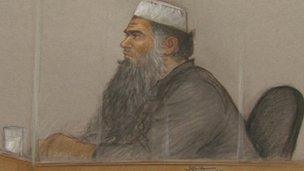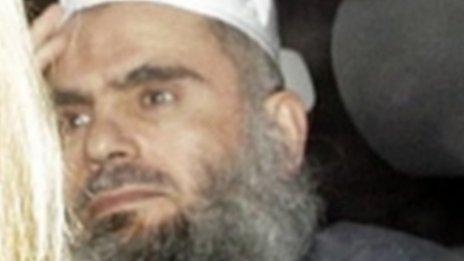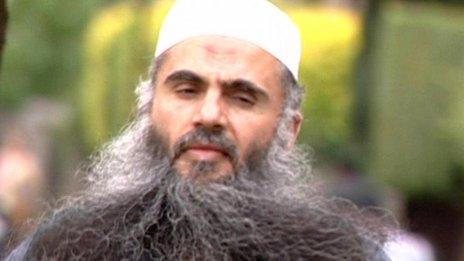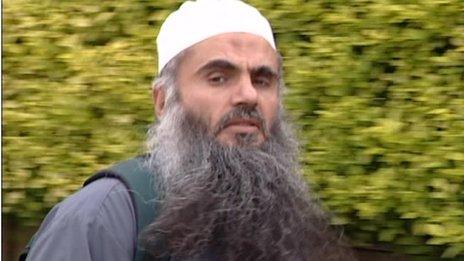Cleric Abu Qatada can be deported, says Theresa May
- Published
- comments
Theresa May: "Today officers arrested and detained Abu Qatada"
Radical cleric Abu Qatada can be deported to Jordan after fresh assurances that he will get a fair trial, the home secretary has told MPs.
In a statement to the Commons, Theresa May said he could now be removed from the UK "in full compliance of law".
But she admitted it may take "many months" as his lawyers could appeal up to the European Court of Human Rights.
Abu Qatada, 51, who faces charges in Jordan of plotting bomb attacks, was arrested earlier and denied bail.
A judge at a Special Immigration Appeals Commission (SIAC) hearing ordered him to be detained in custody following his arrest by UK Border Agency officials.
Mrs May said he "deserves to face justice" in Jordan but warned that successive governments had been trying to deport him for a decade.
"Deportation may still take time. The proper process must be followed and the rule of law must take precedence," she said.
"But today Qatada has been arrested and the deportation is under way. We can soon put Qatada on a plane and get him out of our country for good."
'No hold-up'
Edward Fitzgerald QC, representing Abu Qatada, earlier told a SIAC hearing the cleric would seek to revoke any deportation order and appeal if unsuccessful.
A Downing Street spokeswoman said the prime minister was confident Abu Qatada would eventually be deported even if there were an appeal process taking "many months".
The European Court of Human Rights blocked his deportation to Jordan in January, saying evidence obtained by torture might be used against him.

Abu Qatada is wanted in Jordan on terror charges
Mrs May travelled to Jordan in March for talks with the king and ministers on the case of the Palestinian-Jordanian, whom ministers have described as "extremely dangerous" and consider a threat to UK national security.
In seeking to satisfy the courts that his human rights would not be violated if he was deported, Mrs May told MPs:
The state security court was not a quasi-military court but a key part of the Jordanian justice system
Abu Qatada's case would be heard in public with civilian judges and his conviction in absentia would be "quashed immediately" upon his return to Jordan
The cleric would be held in a "normal civilian detention centre" with access to independent defence lawyers
His co-accused would be able to give evidence against him without affecting the pardons they have been granted
The Jordanian constitution was changed last autumn to include a specific ban on the use of torture evidence
Jordan's Justice Minister Ibrahim Aljazi said Abu Qatada would be given a fair trial if he was returned to Jordan.
He told BBC Radio 4's PM programme: "What I would say [is] that there is a judgement issued against Abu Qatada in absentia, and when he arrives to Jordan, if he arrives, then he will be facing a fair trial."
Shadow home secretary Yvette Cooper demanded to know whether he would be on a plane to Amman in "weeks, months or years".
She asked in the Commons whether he would still be in Britain when the Olympics began in July.
Keith Vaz, chairman of the home affairs select committee, welcomed the move, but said: "As the home secretary herself said, there are some 15 cases awaiting resolution in the European courts.
"These cases must not be left to crawl through the court system. She must ensure a fast-track system is introduced for the most serious of cases.
"Only through the introduction of this measure can we ensure we do not have another Qatada down the line."
The cleric earlier appeared before a SIAC hearing in central London following his arrest on Tuesday afternoon.
Lawyers for Mrs May told the hearing she intended to deport the cleric on or around 30 April.
Edward Fitzgerald QC, representing Abu Qatada, said the arguments for deportation were based on "a series of unsubstantiated claims".
He denied there had been changes to the Jordanian constitution and said there was no evidence Abu Qatada's co-defendants had received pardons.
Robert Tam QC, representing Mrs May, said the cleric should be denied bail as he still had a high standing among extremists and could go into hiding like he did between 2001 and 2002.
A British judge ended Abu Qatada's six-year UK detention in February, weeks after the European Court of Human Rights blocked his deportation.
Ibrahim al-Jazi, Jordan's Justice Minister: "Qatada will face a fair trial"
He was released from Long Lartin high-security jail in Worcestershire on strict bail conditions, external, including a 22-hour curfew allowing him to leave home for a maximum of an hour, twice a day.
Shortly before the cleric was arrested, Conservative MP Peter Bone told the BBC the government should deport him and deal with any legal consequences afterwards.
But human rights lawyer and campaigner Aamer Anwar accused UK ministers of "condoning torture" by persevering with attempts to send him for trial in Jordan.
Shami Chakrabarti, director of civil rights group Liberty, said credit should go to Mrs May for resisting "many calls" to deport him by flouting the law.
"She has not courted popularity by doing this and has recognised there will be new legal scrutiny of the latest assurances that she has obtained from that country," Ms Chakrabarti said.
Abu Qatada has never been charged with any offence in the UK but British authorities have previously said he gave advice to those who aimed "to engage in terrorist attacks, including suicide bombings".
He faces a re-trial in Jordan for plotting bomb attacks against American and Israeli tourists during the country's millennium celebrations, offences he was convicted of in his absence.
- Published7 March 2012

- Published14 February 2012

- Published15 February 2012
- Published26 June 2014

- Published9 May 2012

- Published23 February 2012

- Published16 February 2012

- Published13 February 2012